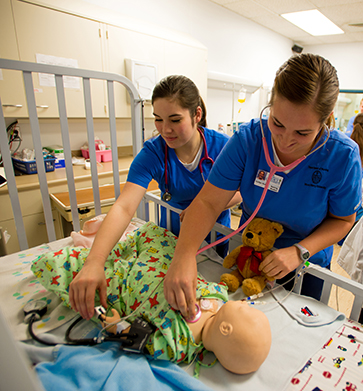 Improvements to come
Improvements to come
Upgrades to labs will benefit both undergraduate and graduate nursing programs—including the new Doctor of Nursing Practice (DNP) program that launched this fall. The main campus telehealth room will connect to a provider telehealth room located at Mount Mercy’s CRST International Graduate Center, allowing DNP students the opportunity to simulate the nurse practitioner role at a distance, while undergraduate students use the telehealth assessment and diagnostic equipment to further develop their skills.
“Eighty-five percent of Mount Mercy’s nursing graduates have remained in Iowa—the majority in Eastern Iowa,” said Mary Tarbox, dean of MMU’s new Martin-Herold College of Nursing & Health. “The simulation and telehealth experiences will be essential in preparing all nursing students for urban and rural health care services.”
Eighty-five percent of Mount Mercy’s nursing graduates have remained in Iowa—the majority in Eastern Iowa.
Nursing in rural areas
This is especially important, Tarbox says, because of Iowa’s shortage of nurses in rural areas. According to a Henry J. Kaiser Family Foundation publication, Tapping Nurse Practitioners to Meet Rising Demand for Primary Care, more than 58 million Americans reside in geographic areas where the supply of primary care professionals falls below federally defined standards.
“Our DNP program focuses on rural health, experiences in innovation, and entrepreneurial skills designed to address this deficit,” Tarbox says.